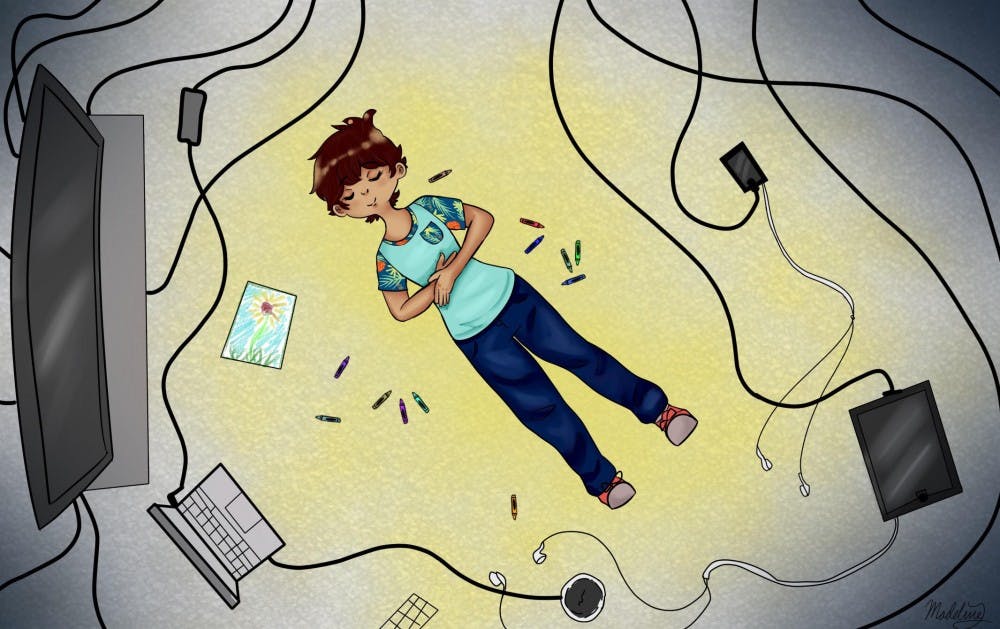A new semester is in full swing and so is the initiative to promote mental health and wellness around campus.
Wellness is a concept that encompasses psychological, physical and spiritual well-being, says Gabriella Poetzl, a downtown aquatics management intern at the Sun Devil Fitness Complex.
“It’s about taking care of your mind, spirit and body and acknowledging that connection,” Poetzl says.
She says one of the ways students can fully focus on this connection is by unplugging, or putting away technology and separating themselves from distractions of the cyberworld.
Poetzl says she is an advocate for unplugging because she saw the effects unplugging can have on mental health while working at a children’s health clinic during her time as a social work graduate student. She also had the opportunity to spend a year in a foreign country where she did not have access to cell phone service.
Poetzl says she saw changes in herself during this time. She says it helped her see what it was like to not rely on her phone for things all the time.
“I had an added sense of anxiety about my email, missing messages and responding to an emergency,” Poetzl says.
Her time without a phone showed her how often she depended on it throughout a day, Poetzl explains. Although living without it was an adjustment, she says she eventually found herself more present and focused.
Technology and social media can be outlets of connection and productivity, but they can also be addictions that lead to negative thoughts and habits, Poetzl says.
“We wake up and the first thing most of us do is get on Facebook, check our messages, go on Instagram and Twitter,” Poetzl says. “Millennials grew up in a world where they have access to technology at all times.”
The continuous intake of social media can be distracting because it pulls people’s attention in too many directions, says Nika Gueci, the Executive Director of the University’s Center for Mindfulness, Compassion and Resilience.
“Being aware of what we’re consuming, whether it is food, TV or social media, is important in maintaining a healthy balance,” Gueci says. “Unplugging from social media and bringing our awareness back to the present moment can help reduce stress and allow us to focus on what is in front of us.”
She says there are several ways students can practice mindfulness. The first step is being aware of everyday choices and finding ways to adopt healthier habits. This would help students pay more attention to their bodies, such as if they feel different when they get 10 hours of sleep versus eight hours or when they exercise versus when they do not.
“Noticing your habits can lead to more informed decision-making, and that is what wellness is: making the daily decisions that allow you to be your best self,” Gueci says.
She says those who unplug as a method for being mindful perform better socially and academically because they have more focus and less stress. They form better time management skills by setting aside parts of their day to strictly better their mental health.
“Mental health affects everything you do,” says Madison DeHaven, a senior nutrition major. “If you have well-balanced mental health, you’re going to be friendlier to people and interact with them more clearly. It also allows people to think more clearly, which can help with their school work and learning process.”
DeHaven is the President of Proud2Bme, a student organization that raises awareness and educates people about body image and eating disorders. She says consuming social media and carelessly scrolling through it can impact people’s attitudes toward themselves and others.
Most people only post the “highlight reel” of their life on social media rather than exposing everything they are feeling and experiencing, DeHaven says.
She says that while this is understandable, the issue is that not everyone is cognizant of this and may unrealistically compare themselves to others.
“If you don’t recognize that everyone is probably putting only the good stuff up, it can definitely feel like everyone is having more fun than you,” DeHaven says. “I think there is a bit of media literacy that goes into that, but it can still make people feel down.”
There are plenty of ways for people to unplug, such as through meditation, physical activity and art creation, DeHaven explains.
She says all it takes is putting away technology and finding an activity that helps one feel present and aware of their body and thoughts.
The University has resources for students seeking guidance on how to be mindful. It knows it can be difficult to figure this out between school work, extracurriculars and other responsibilities, which is why it is here to help, Gueci says.
Gueci says that while the Center’s offices are located at the downtown campus, it hosts programming activities across each ASU location.
“We hold mindfulness trainings, pop-up events, community-wide events and conferences around mindfulness,” Gueci says. “Our mission is to enforce well-being and mindfulness as a value at ASU.”
While technology use is pivotal to going about a day, taking time to power it off every so often may reduce stress and anxiety.
“I wanted to challenge people’s perceptions of boundaries, technology use and mental health,” Poetzl says. “I also wanted them to simply realize they can connect with people they don’t know. We’re all in the same boat and have struggles, and it’s good to have time with people.”
Technology may put the world at people’s fingertips, but unplugging may put it at ease.
Correction: The print version of this story spelled Madison DeHaven's last name as "Dehaven." This version has been updated to reflect those changes.
Reach the reporter at eataylo3@asu.edu or follow @emily_a_taylor on Twitter.
Like State Press on Facebook and follow @statepress on Twitter.




